
According to data from the Ministry of Health and Family Welfare, India reported 594 new cases of COVID-19 on Thursday, bringing the total active cases to 2,669 from the previous 2,311. Experts suggest that in the coming days, there may be a surge in COVID-19 cases as India grapples with the emergence of the new sub-variant, JN.1.
JN.1, derived from the Omicron variant's sub-variant BA.2.86, gained attention at the beginning of 2022 when BA.2.86 wreaked havoc worldwide. Not only in India but the JN.1 COVID-19 variant is rapidly spreading globally, earning it the designation of a 'Variant of Interest' by the World Health Organization (WHO). The question arises: does it pose a serious threat, and if so, how concerning is it?
Is there a significant threat?
Dr. V.K. Paul, a member of NITI Aayog (Health), mentioned, "The JN.1 variant has led to an increase in COVID cases, but there hasn't been a rise in severe cases. This virus is spreading in other countries as well." The WHO emphasizes the need for further studies to understand the health impact of the JN.1 variant. It has also been observed to affect individuals with strong immunity. Countries experiencing winter should remain cautious.
Former WHO scientist Dr. Soumya Swaminathan stated, "Respiratory infections caused by seasonal flu viruses (H1N1 and H3N2), adenoviruses, rhinoviruses, and respiratory syncytial viruses can mimic COVID-19 symptoms. Testing every person with symptoms may not be feasible, so those with severe symptoms or admitted to hospitals with respiratory infections or pneumonia should be tested."
Symptoms of the JN.1 variant
Currently, COVID-19 symptoms remain common across variants. According to the CDC, the JN.1 variant may or may not spread with new symptoms compared to other variants. Common symptoms include fever, runny nose, sore throat, headache, and mild gastrointestinal symptoms.
Should we continue wearing masks?
Dr. K. Kolandaisamy, former Director of Public Health, suggests wearing masks in crowded places such as wedding halls, trains, and buses. However, he adds that mask-wearing is not mandatory at the moment. Elderly individuals, pregnant women, and those with weakened immune systems should avoid crowded places and wear masks if necessary. People with respiratory infections, colds, or coughs should also wear masks in crowded areas.
Is a booster dose necessary?
Vaccines have proven effective in preventing severe illness, but some individuals may have weakened immunity, leading to breakthrough infections. The WHO designates JN.1 as a 'Variant of Interest' due to its transmissibility. Updated vaccine versions are available in several countries, including India.
Dr. V. Ramasubramanyam, an infectious disease specialist at Apollo Hospital, recommends vaccination for the elderly, those with underlying health conditions, and individuals with previous illnesses. This proactive measure can help mitigate the impact of serious diseases.
India Records 752 New COVID Cases, 4 Deaths in 24-Hrs; JN.1 Variant of Concern Raises Alarm
Unveiling the Power of Green Apples: Health Benefits, Side Effects, and More
Does arthritis pain increase in winter? Don't eat these food items even by mistake!